Commonwealth Championship 2025: Daniel Howard Fernandez lifts crown; India shines across categories
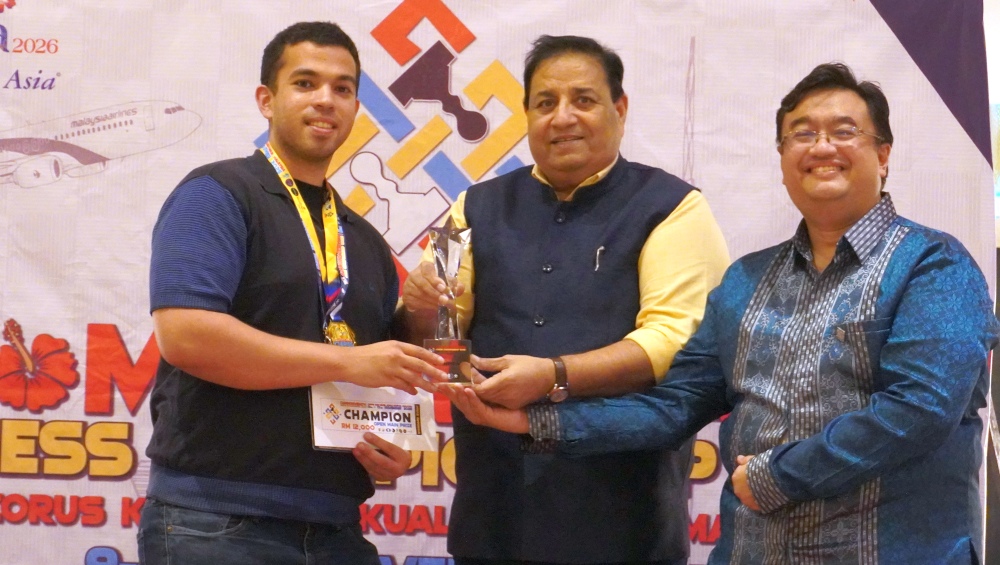
English Grandmaster Daniel Howard Fernandez was crowned Commonwealth Champion as the 2025 Commonwealth Chess Championship concluded on Sunday. Organized by the Malaysian Chess Federation under the auspices of the Commonwealth Chess Association and FIDE, the event brought together 373 players from 17 nations, making it one of the most vibrant editions in recent years. Howard’s steady and confident performance earned him the title with an impressive 7.5/9 points, after he drew his final-round game against India’s FM Adireddy Arjun. The race for second place was fiercely contested, with four Indian players finishing on 7 points. Tiebreaks awarded FM Adireddy Arjun (pictured below) the silver medal and GM Lalit Babu M R the bronze, followed by IM Neelash Saha and GM Deepan Chakkravarthy in fourth and fifth place, respectively. In the Women’s category, which was integrated with the Open event, India demonstrated overwhelming dominance by sweeping the podium. Srija Seshadri captured the gold medal with an impressive performance, while Mary Ann Gomes secured silver and Nisha Mohota claimed bronze. Category highlights The tournament featured a wide range of categories, each showcasing spirited battles and outstanding performances from emerging talents across the Commonwealth. Junior categories: Under-20 (Junior): Singapore’s Goh Zi Han (Gold), Bangladesh’s Tashriq Saihan Shan (Silver), Malaysia’s A’qil A’lauddin Bin Abd Aziz (Bronze). Junior Girls: Sri Lanka’s Sandula K M Dahamdi (Gold), India’s Mrittika Mallick (Silver), Singapore’s Liew Tze Chi (Bronze). Senior: Malaysia’s Ismail Ahmad (Gold), Kenya’s John Mukabi (Silver), India’s IM Sekhar Chandra Sahu (Bronze). Open youth categories: Under-08: Malaysia’s Muhammad Aariz Daniel Bin Mohd Shah (Gold), India’s Prayank Gaonkar (Silver), Sri Lanka’s Basnayake Kevon Dulkith (Bronze). Under-10: Sri Lanka’s CM Karunasena A P Chenitha Sihas Dinsara (Gold), India’s Parv H Hakani (Silver), India’s Nidhish Shyamal (Bronze). Under-12: India’s CM Madhvendra Pratap Sharma dominated with a perfect 9/9 points (Gold), Singapore’s AFM Aaradhya Suyog Bagul (Silver), Sri Lanka’s CM Wijerathna Vinuka Dihain (Bronze). Under-14: India’s AIM Adhiraj Mitra (Gold), Sri Lanka’s Wickramasinghe V W A Vinuda Vidmal (Silver), India’s FM Reyan Md. (Bronze). Under-16: India’s IM Borgaonkar Akshay (Gold), Sri Lanka’s Induwara T H D Thisarindu (Silver), India’s CM Velavaa Ragavesh (Bronze). Under-18: India’s IM Sriram Adarsh Uppala delivered a dominant performance with 9 points (Gold), India’s Borkhetariya Devarsh M (Silver), Singapore’s Lee Tsuen Jin Aiesec (Bronze). Girls’ youth categories: Under-08: An Indian sweep with Anaya Sharma (Gold), Anvi Deepak Hinge (Silver), and Teesha Byadwal (Bronze). Under-10: India’s Vanshika Rawat (Gold, 8/9 points), Malaysia’s Maha A/P Nathan (Silver), India’s Kiyanna Parihaar (Bronze). Under-12: India’s WCM Divi Bijesh (Gold), Singapore’s Liew Tze Yu (Silver), Australia’s Daniel Suria (Bronze). Under-14: India’s Aditri Shome (Gold, 8.5/9 points), Sri Lanka’s De Silva B P Chanthuli Thanishka (Silver), India’s WFM Saranya Devi Narahari (Bronze). Under-16: Another Indian sweep with FM Prishita Gupta (Gold), Ananya Raman (Silver), and Aswinika Mani R (Bronze). Under-18: India’s Sagar Siya (Gold), India’s WCM Anupam M Sreekumar (Silver), Bangladesh’s WCM Omnia Binta Yusuf Lubaba (Bronze). The championship concluded with a vibrant closing ceremony, where Bharat Singh Chauhan, President of the Commonwealth Chess Association, and Akhramsyah Muammar, President of the Malaysian Chess Federation, presented the awards. The 2025 edition not only celebrated exceptional individual talent but also highlighted the growing depth and competitive spirit across Commonwealth nations, reaffirming the event’s status as a landmark festival of chess. Complete results are available on chess-results.com.
FIDE launches Global Survey on Chess in Education
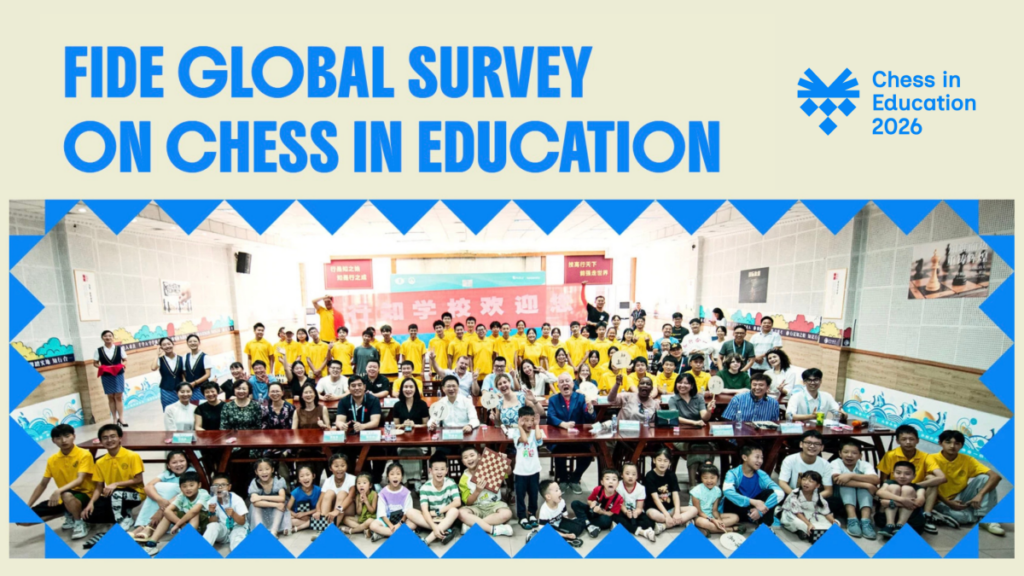
The International Chess Federation (FIDE) has announced the launch of its Global Survey on Chess in Education, inviting federations, schools, and partner organizations worldwide to participate before February 28, 2026. This initiative aims to gather essential insights to guide FIDE’s Educational Strategy and Action Plan for 2027–2030, ensuring that chess continues to grow as a powerful tool for learning and inclusion. In his official message, FIDE President Arkady Dvorkovich emphasized the importance of this effort, recalling the success of the 2021 survey which revealed that more than 25 million children and 237,000 teachers and trainers were already engaged in educational chess. Since then, FIDE has expanded training courses, launched certification systems, organized international conferences, and facilitated research projects worldwide. The new survey will: Identify global trends in educational chess and strengthen FIDE’s policies. Support visibility and recognition at the highest international levels, with results to be shared with UNESCO, UNICEF, ministries of education, universities, and NGOs. Encourage participation by confirming that survey responses will be taken into account when awarding Chess in Education grants in 2026. Prepare the ground for a landmark initiative: 2026 has been declared the Year of Chess in Education, celebrating and expanding chess as a medium for learning and growth. FIDE warmly invites all federations, schools, and partner organizations to contribute to this important effort. By participating, stakeholders will help demonstrate the global power of chess as an educational catalyst, attract new sponsorship opportunities, and empower millions of children, teachers, and communities worldwide. The survey is available in English, Spanish, and Russian. Please read the Presidents s letter and access the Global Survey [HERE].
FIDE World Cup: Quarterfinals set after high-stakes Round 5 tiebreaks

The FIDE World Cup in Goa reached a boiling point today as four intense tiebreak matches unfolded, each with a place in the quarterfinals on the line. With no more second chances and yesterday’s classical draws setting the stage, today’s rapid and blitz battles brought drama, tension, and decisive outcomes across the board. Before the games began, the ceremonial first move was made for Lê Quang Liêm on Board 2, by Mr. Kedar J Naik, Member of the Legislative Assembly of Goa and Chairman of the Goa Tourism Development Corporation. Sam Shankland and Andrey Esipenko secured clean wins early in the first rapid portion against Daniil Dubov and Alexey Grebnev respectively, while José Martínez defeated Pentala Harikrishna in the 10+10 rapid. Alexander Donchenko took Lê Quang Liêm into blitz territory before stamping his ticket to the next round. The quarterfinal lineup is now complete, and as the dust settled, four more players advanced with confidence and momentum on their side. Round of 16 tiebreaks results: Daniil Dubov 1-3 Sam Shankland Andrey Esipenko 2.5-1.5 Aleksey Grebnev José Martinez 3.5-2.5 Harikrishna Pentala Alexander Donchenko 4.5-3.5 Lê Quang Liêm Here’s how the day played out: Daniil Dubov – Sam Shankland In earlier interviews, Daniil Dubov made no secret of his strategy: to steer matches into tiebreaks. As a former World Rapid Champion, he felt this format played to his strengths. He also claimed that playing solidly with White and pushing with Black was the best way to capitalize on opponent’s overextending. But today, Sam Shankland flipped that plan on its head. Playing White in the first rapid game, he unleashed a novelty in the opening that led to an imbalanced position and early initiative on his side. With pressure mounting and the clock on his side, Shankland methodically limited Dubov’s options. Dubov, rarely short of creative ideas, struggled to find counterplay and instead fell into mistake after mistake, resulting in a convincing win for the American. The second game, a symmetrical English, saw early queen exchanges and a dry position that offered little for either side. A draw seemed impending, but Dubov overpushed in the endgame, losing the game and with it, his World Cup run came to an end. After the match, Shankland reflected on reaching the quarterfinals once before in 2021, a run that ended painfully at the hands of Sergey Karjakin in tiebreaks. “That’s haunted me ever since,” he admitted, adding that he now hopes to “banish the demon” for good. https://www.youtube.com/watch?v=PTRXDSWaWkA Andrey Esipenko – Alexey Grebnev It raised eyebrows when Andrey Esipenko took relatively quick draws in his classical games against Alexey Grebnev. But if anyone doubted his strategy, the first rapid game removed all uncertainty. After a Petroff turned into a wild opposite-side castling battle, Esipenko seized the initiative by move 14 and was in complete control by move 20. It was a dominant win. The second game was a stark contrast and stretched all the way to move 145. Esipenko, now with Black, came out of the opening in a stable position. When it looked like both players were shuffling pieces with no progress, Esipenko made a bold choice to open up the queenside. This ambition backfired with a missed tactic, and suddenly Grebnev was up a pawn. But nerves kicked in and Grebnev misplayed the critical move order and let Esipenko seize control once more The game soon turned into a technical endgame with each side down to a rook and Grebnev holding two pawns to Esipenko’s one. Esipenko, calm and prepared, navigated the position to a theoretical draw. Ironically, by move 145, both players had more time on their clocks than they did on move 50. With this match victory, Esipenko reached the deepest stage of a FIDE World Cup in his career. Harikrishna Pentala – José Martinez This was widely expected to be the longest match of the day, especially after the first two rapid games ended in uneventful draws. Much of the chatter centered around José Martínez’s reputation as a blitz expert, regularly beating the world’s best online. That meant Harikrishna’s best chances were in the rapid phase. In their first rapid game, the players entered a Richter-Rauzer Sicilian and while both appeared prepared, a few subtle inaccuracies left Harikrishna with isolated doubled pawns and passive pieces. Martínez, whose pieces worked seamlessly together, activated his rooks and pushed the kingside majority. The result was a smooth breakthrough and the first decisive game of their match – a must-win situation for Harikrishna in game two. In the second game, Harikrishna opted for an offbeat Caro-Kann with …Na6 on the third move, likely intending to avoid his opponent’s preparation. The opponents quickly entered unexplored territory and a critical position arose at move 21: Harikrishna quickly played 20…Nd3?, a move which our commentator Peter Leko exclaimed is a good move if it does not lose. Martinez had to see the important move 21.g4! and after 21…Qe4 suddenly 22.Bxf7+ gives White a huge advantage as capturing is not possible due to Ng5. Instead, Martinez played 21.Rad1 and the position became equal once more. In his post-game interview, he acknowledged seeing this line but decided to not enter the complications. Even so, the move g4 was played a few turns later, this time with full effect. Harikrishna erred instantly and Martinez seized a decisive advantage. With everything in hand, Jose chose a threefold repetition to seal the draw and punch his ticket to quarterfinals. In his interview, Martinez issued a spirited challenge to the field: “Those who want to go far in this World Cup have to get through me.” With his confidence and composure, it’s easy to see why he’s becoming one of the breakout names of the tournament. https://www.youtube.com/watch?v=x8VM1iNxW9s Alexander Donchenko – Lê Quang Liêm The last match of the day to finish briefly seemed like it would actually be the first match to finish after Alexander Donchenko struck first with the black pieces. After yesterday’s tense and heartbreaking draw where one misstep in the
WCCC 2025: Greco crowned the smartest company in the world

The final day of the 2025 FIDE World Corporate Chess Championship saw Greco crowned Corporate Chess Champions and officially recognised as the smartest company in the world. After an intense round-robin phase, the competition moved to the semi-finals, where the four strongest teams – Morgan Stanley, Greco, Deloitte, and Google – faced off in knockout matches to decide the title. By the end of the afternoon, Greco had emerged victorious after a closely contested final against Morgan Stanley, bringing this year’s championship to a dramatic finish inside the FIDE World Cup hall in Goa. Excitement filled the room from the first move. Whether it was the thrill of representing their companies on a global platform, being within reach of a world title, or competing in the same hall as the World Cup, the players (all non-professionals) were fully focused. Almost every board featured titled competitors, and the chess was intense from the outset. Semifinals The semifinals featured Morgan Stanley vs Google and Greco vs Deloitte, with each match played over two rounds. In the event of a tie, a sudden-death game would have been used to decide the winner. In the match between Morgan Stanley and Google, the rating difference was clear, with Morgan Stanley outranking their counterparts by 200 to 500 points on every board. They confirmed their status as favourites by sweeping both rounds 4-0. With a perfect 8-0 match score and not a single half-point conceded, Morgan Stanley cruised into the finals. The encounter between Greco and Deloitte was more tightly contested. On paper, Greco had the edge thanks to the presence of GM Volodymyr Onyshchuk (2608) on the top board. They took the first match 3.5–0.5. As IM Sagar Shah observed on the live ChessBase India broadcast, the second match was significantly closer, with Deloitte holding a draw on board two and pushing on others. In the end, Greco repeated the same match score of 3.5-0.5 to book their spot in the finals. FINALS Morgan Stanley vs Greco The championship match between Morgan Stanley and Greco brought the two strongest teams of the event head-to-head. The matchups were finely balanced: Greco outrated Morgan Stanley on boards one and four, while Morgan Stanley held the rating edge on boards two and three. The opening round reflected this balance. GM Joshua Sheng struck first for Morgan Stanley, securing victory on board two. On the remaining boards, the clock played a significant role as the 10+3 time control led to scrambles in equal or better positions. The first round ended in a tense 2-2 draw, setting up a dramatic second match. GM Alojzije Janković, commenting on-site, compared some of the positions to those in the World Cup itself, noting the remarkably high level of chess across all boards. Despite the rating differences, the tides shifted throughout, leaving spectators and commentators on edge. In the end, Greco prevailed with a commanding 3.5-0.5 win in the second match, securing their place as 2025 World Corporate Champions. Deloitte vs Google In the bronze medal match, Deloitte took the early lead with a 3-1 win in the first round and repeated the same result in the second, securing third place in the championship. Their play was solid and consistent under pressure, earning them a podium finish behind the two tournament frontrunners. Game of the tournament One encounter stood out as a highlight of the entire championship. IM Sagar Shah called it the game of the tournament. In the position after 31…Qe4-Qc6, GM Joshua Sheng (White) was a piece down against IM Valeriy Grinev, but engines evaluated it as equal due to White’s activity. The commentators pointed out the stunning tactical opportunity: 32.Qxg7! The queen cannot be captured as 32…Rxg7 fails to 33.Rxd8#. The only defense for Black in this case would have been 32…Qe8, still holding equality. Instead, Sheng played 32.Rd6, and after 32…Qh1+, the game was drawn soon by three-fold repetition. Chess and business share a natural connection. Both require strategic planning, flexibility under pressure, and precise decision-making in complex situations. More companies are embracing chess not just as a recreational pastime, but as a tool to develop these skills among employees. Internal chess clubs, learning sessions, and corporate tournaments form part of a workplace culture built around challenge and collaboration. On today’s broadcast, WGM Keti Tsatsalashvili recalled visiting Meta’s offices after last year’s finals in New York, where she found chess boards in most rooms and learned the company even maintains its own internal rating system, an example of how deeply chess is woven into corporate environments. This movement toward chess in the workplace is evident at the FWCCC. Grandmaster Praggnanandhaa, who made the ceremonial first move yesterday, commented, “It’s great to see big companies like Google, Microsoft, Deloitte, Tech Mahindra all here… it shows how chess is expanding into the corporate world,” adding, “If companies find chess interesting and join, even in a small way, it’s great for the game.” As Gabor Szamoskozi from Morgan Stanley shared, “We’ve been running an interoffice chess tournament for more than a decade now. Participation has grown, more than 1,000 players take part every year.” He added, “Chess teaches us to think ahead under time pressure, just like in business. It’s no surprise the game resonates so well with people in our field.” The trend goes beyond office walls. Leading companies now support chess at the highest levels, from Google sponsoring the 2024 FIDE World Championship Match, to Morgan Stanley supporting Judit Polgar’s Global Chess Festival, and Tech Mahindra’s continued backing of the Global Chess League – to name a few. The FIDE World Corporate Chess Championship reflects this growing synergy, bringing together teams who apply the same analytical thinking and teamwork on the chessboard that they use in their daily work. It’s a clear sign that modern business culture values intellectual challenge, community, and strategic excellence in equal measure. Companies interested in joining this movement and competing at next year’s FWCCC are encouraged to contact FIDE for early registration and participation details.
World Cup Round 5 Game 2: Chinese momentum, Uzbek steel, and Armenian tragedy in a thrilling day of chess
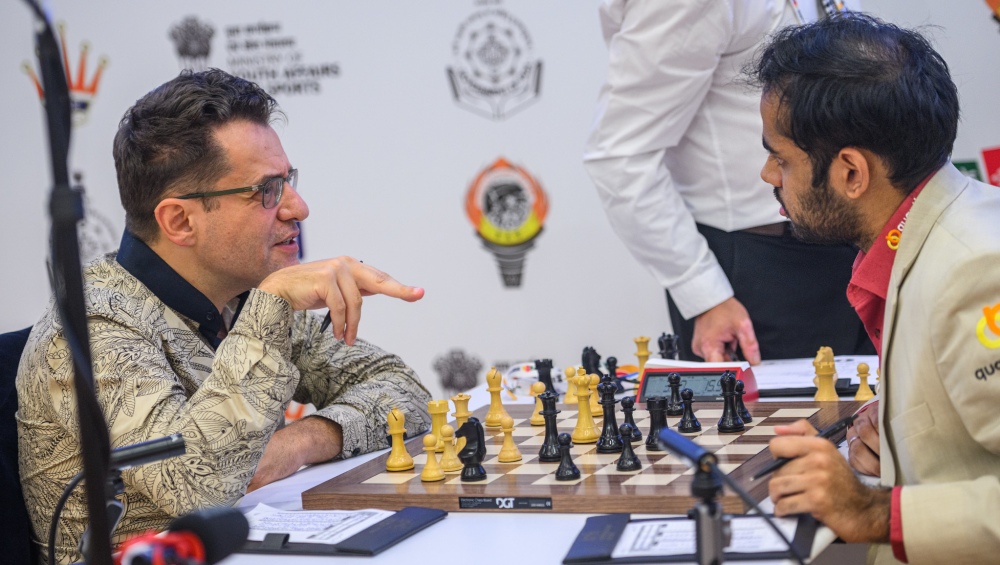
Round after round, the FIDE World Cup in Goa continues to deliver high-level chess and gripping storylines. Today’s classical games brought a mixture of precise technique, strategic battles, and edge-of-the-seat tension, with several matches heading toward the inevitable tiebreaks. From commanding wins to miraculous escapes, the field once again showcased the depth and fighting spirit of the world’s elite players. It was a difficult day for Armenian chess, marked by the sudden and emotionally heavy exit of two of its most iconic figures. Levon Aronian, once the heartbeat of Armenian teams and now a pillar of American chess, fell after a tense, error-studded battle. Minutes later, Gabriel Sargissian, long admired for his team heroics and impeccable opening preparation, also bowed out after a single, costly misstep. Their simultaneous elimination closed a chapter of resilience and brilliance that has defined Armenian chess for two decades. But if anyone needed a reminder of the steely resolve that made Uzbekistan Olympiad champions, today’s games provided it. Under pressure, under fire, or under the clock, the Uzbek players simply refused to break. Javokhir Sindarov coolly neutralized every attempt to unbalance him, while Nodirbek Yakubboev struck with cold precision to secure his spot in the next stage. Their collective discipline and composure have become one of the defining narratives of the event: unyielding, confident, and remarkably mature for such a young squad. Let’s take a closer look at this afternoon’s action in the Goa Resort Rio. With so much at stake, it was clear from the outset that several matches were destined for the tiebreaks. And indeed, the first two games to finish — just shy of the two-hour mark — were precisely the two I had predicted before the round began. The round was officially opened by GM Humpy Koneru, runner-up of the Women’s World Championship and reigning two-time Women’s World Rapid Champion, who performed the first ceremonial move on Board 3 for former World Rapid Champion GM Daniil Dubov. GM Daniil Dubov’s (2684) classical-game strategy in this event has been remarkably consistent: minimise risk, avoid unnecessary complications, and steer the match toward rapid tiebreaks, where he excels as a former World Rapid Champion. It was therefore no surprise that he opted to reproduce a line from a previous game between GM Sam Shankland (2654) and GM Dmitry Andreikin in the Grünfeld Defence: a highly theoretical path that, with accurate play, leads almost inevitably to a draw. In this variation, Dubov sacrifices a pawn, but with precise moves there is virtually no danger of losing (or winning). A 99% accuracy rate tells the story well enough. I caught up with Shankland as he was leaving the venue. After congratulating him on his performance so far, he referenced that very game against Andreikin: “It’s a dead draw. I think he wants to play the tiebreak.” The second game to finish, also showing an impressive 98% accuracy, was the encounter between GMs Aleksey Grebnev (2611) and Andrey Esipenko (2693). In a fully symmetrical Queen’s Gambit Accepted, neither player was willing to take even the slightest risk, both likely believing they hold the upper hand in the tiebreaks. With two open files on the board, they exchanged rooks on one of them and then repeated moves, reaching the thirty-move mark with most of the pieces still in play. This match has been the most evenly balanced of all eight pairings, and predicting a favourite in the rapid segment feels nearly impossible. It would not be surprising if this one ends up going all the way to blitz before a winner emerges. Over an hour passed before the next result came in. With White, GM Pentala Harikrishna (2697) attempted to press GM José Eduardo Martínez Alcántara (2644) in an offbeat line of the King’s Indian Attack. The former Indian Olympiad team member managed to create a mild pull in the early middlegame, but Martínez Alcántara’s defensive technique was flawless this afternoon. After a series of mass simplifications, the players agreed to a draw on move thirty-five in a level endgame. This tiebreak is also extremely hard to call. Martínez Alcántara is a blitz specialist — his online results rival those of Carlsen and Nakamura — and he currently holds a slightly higher FIDE rapid rating. But Harikrishna’s vast experience and steadiness under pressure mean he will be anything but an easy opponent. Within the space of just ten minutes, the first two decisive results of the day arrived back-to-back and, with them, the elimination of the two Armenian legends still remaining in the event: Levon Aronian (now representing the USA) and Gabriel Sargissian. The clash between heavyweights GMs Levon Aronian (2722) and Arjun Erigaisi (2773) delivered all the excitement one could hope for. The opening and middlegame remained largely balanced, but as the players approached time trouble, the tension rose and the mistakes began to appear. Aronian has just played 33.Qf2–f1, a move that looks perfectly normal at first glance, but a hidden tactical shot was lurking. Erigaisi, likely focused on other strategic ideas, missed the powerful 33…Bxh2!, winning a pawn. The point is revealed after 34.Kxh2 Rxe3! 35.Rxe3 Qf4+, picking up the rook with a winning position. Instead, 33…Re6? was played. Even so, giving a player of Erigaisi’s caliber a second chance is rarely survivable. A few moves later, under increasing pressure, Aronian finally faltered. Here, Aronian needed to play 38.Rf1 to keep the game going. Instead, his fatal 38.Re1?? allowed the crushing response 38…Nh3!, and with it, his elimination. White’s queen is completely overloaded, unable to defend both the rook and the bishop (which is itself guarding against mate on h2). After 39.gxh3 Rxe1 followed by …Qxf3#, or the spectacular 39.Qf1 Nxg1 40.Rxe6 Qh2#, there is no escape. “It was a tough match; at some point, I started regretting some of my moves, and I wasn’t sure about my position. When he offered me a draw, my confidence increased,” Erigaisi explained afterward in his interview with Charlize van Zyl. https://www.youtube.com/watch?v=RCkrOP4IAic&t=2s The second Armenian player to
FWCCC 2025: Morgan Stanley, Deloitte, Greco, and Google through to semi-finals
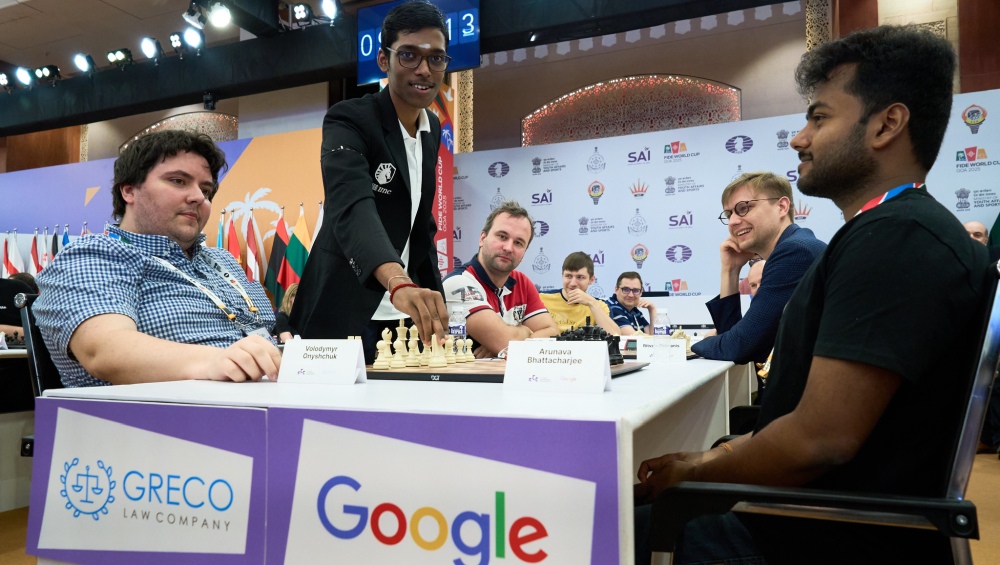
Day 2 of the FIDE World Corporate Chess Championship 2025 concluded the group stage of the event, with Morgan Stanley and Deloitte 1 qualifying from Pool A and Greco and Google qualifying from Pool B. Tomorrow they will face off in the semifinals, followed by the final to decide the 2025 World Corporate Champions. The second half of the group stage saw the continuation of the double round-robin format, where the teams played each other again, this time with reversed colours. The day started off with a special moment for all participants as Grandmaster Praggnanandhaa R visited the venue as Guest of Honor. He made the ceremonial first move on the top board, met the teams and posed for photos – a rare opportunity for corporate players to meet one of the world’s leading super grandmasters. Pool A The second half of the double round-robin confirmed Morgan Stanley as the clear frontrunners of Pool A. They finished with 18 match points and 31 game points, losing only one match, the final round of the day, against Microsoft. Deloitte 1 secured the second qualifying spot with 15 matchpoints, though the final standings tightened after a key result in the return leg against Microsoft. Yesterday the match was tightly drawn, but today Microsoft struck with a 2½–1½ victory, temporarily putting pressure on the qualification race. Deloitte responded strongly in their remaining encounters, holding their position ahead of Microsoft, who finished third with 13 matchpoints. Final Standings Pool A Morgan Stanley — 18 MP / 31 GP Deloitte 1 — 15 MP / 27.5 GP Microsoft — 13 MP / 23.5 GP UBS — 10 MP / 22 GP Tech Mahindra — 4 MP / 12 GP Equity Bank, Kenya — 0 MP / 4 GP Pool B Pool B completed its return legs as well, with Greco maintaining full control of the field. They finished the group stage unbeaten with 20 matchpoints and 28 gamepoints, confirming their status as one of the most dominant teams of the championship. The battle for second place between Google and J.P. Morgan unfolded across both days. Yesterday Google had won their first meeting by a wide 4–0 margin, but today J.P Morgan struck back with a close 2.5-1.5 victory. This result opened the door for J.P. Morgan to chase on tiebreaks, but Google’s superior gamepoint total ultimately secured their qualification. Deloitte 2 also delivered an impressive turnaround on the final day. They defeated J.P. Morgan 2½–1½, reversing the outcome of their first encounter and coming within striking distance of second place. Final Standings – Pool B GRECO — 20 MP / 28 GP Google — 12 MP / 15.5 GP J.P. Morgan — 12 MP / 14.5 GP Deloitte 2 — 10 MP / 15 GP ERG — 6 MP / 7 GP Player spotlight: Saraswat Tushar (Tech Mahindra) One of the standout individual performances of the day came from Saraswat Tushar of Tech Mahindra. Rated just 1702, he produced multiple upsets against much higher-rated opponents, including an astonishing win over FM David Moskovic (2314) from Morgan Stanley. A key moment arose in his game against Georgios Tsichlis (2123, Microsoft). After White played 35.g3??, Tushar found the precise refutation: 35…Rxh2! Following 36.Kxh2 Qxf2+, Black launched a decisive attack and soon forced resignation. Last night’s social programme brought all teams together for a relaxed networking evening inside the playing hall. The session began with a masterclass by GM Alojzije Janković, followed by an informal gathering where teams played bughouse, exchanged stories, and learned more about each other’s internal chess cultures. The Google team, for example, shared that more than 2,500 employees actively participate in chess inside the company, supported by bi-weekly events hosted on Lichess. ChessBase India also made a guest appearance, engaging with teams and capturing moments from the evening. As the group stage concludes, players now shift their attention to the decisive final day. Many continued their afternoon by watching Round 5, Game 2 of the FIDE World Cup, taking advantage of the unique setting where two major FIDE events run side by side in Goa. Tomorrow promises a dramatic finish, with semifinal matchups set to determine which two companies will compete for the championship trophy. Written by Charlize van Zyl, FIDE Press Officer (Goa, India) Photos: Eteri Kublashvili
World Cup Round 5 Game 1: Sindarov strikes as giants battle to a standstill in Goa
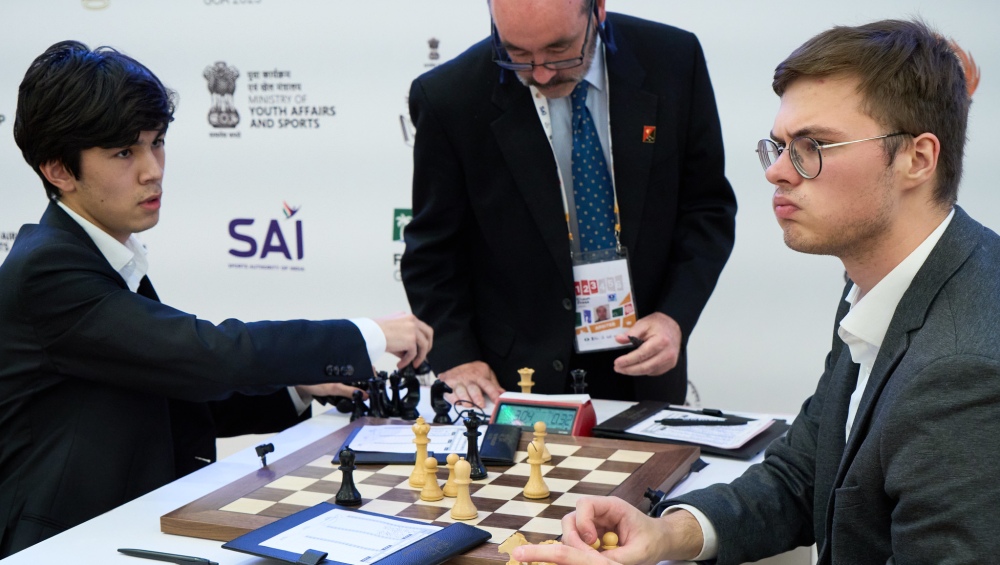
The atmosphere at the Rio Resort in Goa was electric this afternoon as players returned to the boards for another round of top-level action. The spotlight quickly shifted to Board 2, where Levon Aronian and Arjun Erigaisi delivered one of the most engaging and dynamic games of the day, drawing considerable attention from spectators and commentators alike. The ceremonial first moves were executed by two distinguished guests from the European chess community: Gunnar Björnsson, CEO of the Icelandic Chess Federation and Vice President of the European Chess Union, and Alojzije Janković, also a Vice President of the European Chess Union. Their presence underscored the strong international support and camaraderie surrounding the event. As the pieces were set in motion, anticipation built around whether the sharp tactical exchange between Aronian and Erigaisi would set the tone for the rest of the afternoon. It certainly did – capturing the spirit of competition that has defined this year’s battles in Goa. After around ninety minutes of play, the first result of the afternoon arrived. The Peruvian-Mexican phenomenon, GM José Eduardo Martínez Alcántara (2644), continued his remarkable run by securing a solid draw against India’s GM Pentala Harikrishna (2697). Martínez Alcántara has been producing the tournament of his life. In the previous two rounds, both times with the black pieces, he claimed impressive victories over GMs Nodirbek Abdusattorov and Alexey Sarana, winning the opening game of each match. Today, armed with the white pieces, he entered a deeply theoretical line of the Two Knights Defence, in which White typically gains a pawn at the cost of structural weaknesses and falling behind in development. Play followed established theory up to move twenty-five, with at least sixteen moves matching top-level over-the-board or correspondence encounters found in current databases. All known predecessors have ended in draws, including one by GM Javokhir Sindarov, also competing in this Round of 16. Given the speed and confidence with which both players executed their moves, it was evident they were well-prepared and content with a balanced outcome. Harikrishna will enjoy the white pieces in tomorrow’s game, while Martínez Alcántara has already demonstrated lethal form with black, having defeated both his previous opponents from that side of the board. With both players registering 99% accuracy, a peaceful result was practically inevitable, and fully justified. About an hour later, a short burst of activity swept through the playing hall as three games concluded within ten minutes, all ending in solid, uneventful draws. One of these results came from GM Andrey Esipenko (2693), who, after yesterday’s exhausting tiebreak elimination of tournament favourite Vincent Keymer, opted for a calm and risk-free approach against Aleksey Grebnev (2611). Grebnev himself had just survived a taxing tiebreak against Maxime Vachier-Lagrave, making a peaceful outcome mutually understandable. Drawing inspiration from a 2019 encounter in which Esipenko faced GM Rakhmanov (2638), Grebnev arrived fully equipped with home preparation in one of the most solid and respected continuations of the Petrov Defence. Esipenko attempted to sidestep prior theory with a small refinement – 12.Nb5 instead of the more common 12.Bf4 – but Grebnev remained completely unfazed. He rattled off his first twenty moves with confidence, showing no sign of discomfort. With a fully symmetrical pawn structure on the board and no practical prospects for either side to create winning chances, the players agreed to a draw on move thirty-one. Accuracy scores hovering around 95% reflected the clean and disciplined play delivered by both competitors. What awaits tomorrow remains to be seen, but based on today’s balance of power, this match appears a strong candidate to head for tiebreaks, a scenario in which both Esipenko and Grebnev may feel they have realistic chances to outplay the other. In a symmetrical variation of the English Opening, GM Alexander Donchenko (2641) and GM Lê Quang Liêm (2729) contested a strategically rich, though ultimately balanced, encounter. While the final accuracy scores, an impressive 98% for both players, might suggest a quiet affair, the game was anything but effortless. Both grandmasters invested significant time at key moments, carefully navigating the subtle nuances of the position. One of the most intriguing moments arose just out of the opening. Holding an extra pawn, Donchenko had the tempting option of 18.axb6 axb6 19.Rfc1, but this line allowed Black dynamic possibilities such as 19…Nc4, granting Lê Quang Liêm sufficient counterplay to maintain equilibrium. Recognizing the latent danger, and after deliberating for just over ten minutes, Donchenko chose the prudent path with 18.Qc2, returning the pawn and steering the game toward safety. From that moment, the position began to simplify naturally. Forced sequences followed, exchanges swept pieces off the board, and the game peacefully concluded with a draw on move thirty-one. A clean and professional display from both sides, the game exemplified the high level of precision that has come to define this stage of the tournament. Before the round began, I found myself—as I often do—chatting with fellow specialists while surveying the match-ups from a distance. Theo from Lichess and Shahid from ChessBase India are two of my usual companions in these pre-game exchanges. As we compared notes, Shahid and I agreed that the encounter between GM Gabriel Sargissian (2624) and GM Nodirbek Yakubboev (2689) was as close to a 50/50 toss-up as one could get. Although Yakubboev holds the higher rating on paper, Sargissian’s reputation as a rock-solid competitor, especially with the White pieces, made the prediction far from straightforward. Today’s clash, a pristine 99% accuracy effort by both players, once again highlighted the immense depth and technical discipline of these two grandmasters: no mistakes, no inaccuracies, simply a flawless game. Sargissian repeated his trusted Catalan, but was unable to carve out any meaningful edge from the opening. He ventured into a line that momentarily sacrifices a pawn in pursuit of active piece play, yet Yakubboev calmly returned the material, opting instead to secure a superior pawn structure. Subsequent simplifications flowed naturally, and with the position fully equalized, and both players still holding more than twenty-five minutes on
Winners crowned at FIDE World Amateur Championship 2025
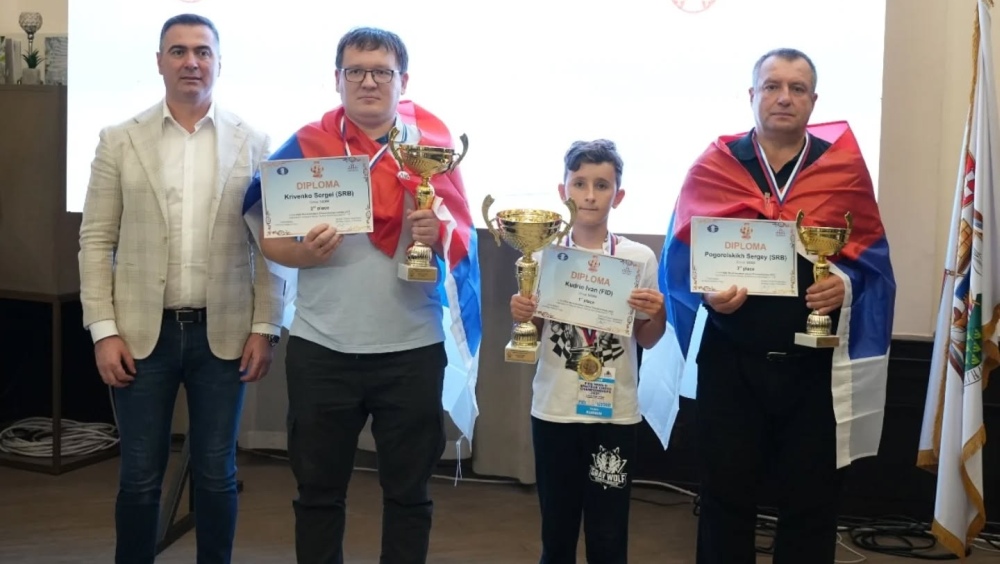
The FIDE World Amateur Chess Championship 2025 concluded yesterday in Vrnjačka Banja, the Serbian capital of tourism. The event attracted 284 players from 51 national federations, culminating in the crowning of winners across all six sections. The best female chess players in the U1700 event are Mouza Nasser Alshamsi, (UAE) scoring 7/9 followed by Ayala Kuanyshbay (Kazakhstan) and Disha U A from India. The open section U1700 saw the triumph of Medet Dyahaparov (Kyrgyzstan) who claimed gold with an excellent score of 8/9. Pathak Anshu Kr (India) and Dulguunjargal Dashdavaa (Mongolia) tied for second place on 7.5/9, with the former clinching silver on tiebreaks. The top female finishers in the U2000 tournament are Khuslenzaya Baldanjantsan from Mongolia (8/9), Wang Minging of Germany (7/9), and Karina Daniela Ferreira Kanzler from Brazil (5.5/9). In the open section U2000, the first place was won by Dejan Jakovljević from Serbia with 8/9. Vo Hoang Quan from Vietnam (7.5/9) took silver, while Arlan Abuzyarov from Kazakhstan completed the podium with 7/9. Tsogtsaikhan Saikhanchimeg from Mongolia (5.5 points), Anna Ivaschenko (4.5 points) and Nadezhda Antonova from Tajikistan (4 points) became the best female chess players in the U2300 competition. The most tightly contested tournament was the U2300 Open section, which ended in a three-way tie for first. Ivan Kudrin (FIDE), Sergei Krivenko, and Sergei Pogorelskikh (both Serbia) all scored 7/9, with Kudrin claiming gold, Krivenko silver, and Pogorelskikh bronze based on tiebreak scores. The closing ceremony featured a performance by a local chorus and the presentation of trophies and diplomas. It was attended by Saša Jevtić, Tournament Director; Ozgur Solakoglu, a representative of the International Chess Federation (FIDE); Andrija Jorgić, President of the Chess Federation of Serbia; and Boban Đurović, President of the Vrnjačka Banja municipality, who officially declared the competition closed. In his address, Solakoglu thanked the organizers for the exceptional level of organization and announced that Vrnjačka Banja will host two more FIDE championships in 2026. “Over these nine days, we witnessed extraordinary glory in honor of chess. From the first move to the last round, players from around the world showed not only skill and determination, but also the true spirit of amateur competition — where passion and respect for the game shines above all else. Congratulations to our winners. Thank you to every participant. You have made this championship lively, competitive and memorable. Whether you won or learned something new, you contributed something truly special. To our hosts — the Chess Federation of Serbia, the city and people of Vrnjačka Banja, arbiters, volunteers and staff — you created an atmosphere in which chess could flourish and friendships could be established,” said Solakoglu. Andrija Jorgić, President of the Chess Federation of Serbia, expressed his pride in hosting the event. “Do not forget that chess is a knight’s game,” he said, “and that the one sitting across from you is not an enemy, but an opponent at the chessboard.” Photos: Savo Tufegszic Official website: worldamateur2025.fide.com
2025 FIDE World Corporate Chess Championship opens in Goa
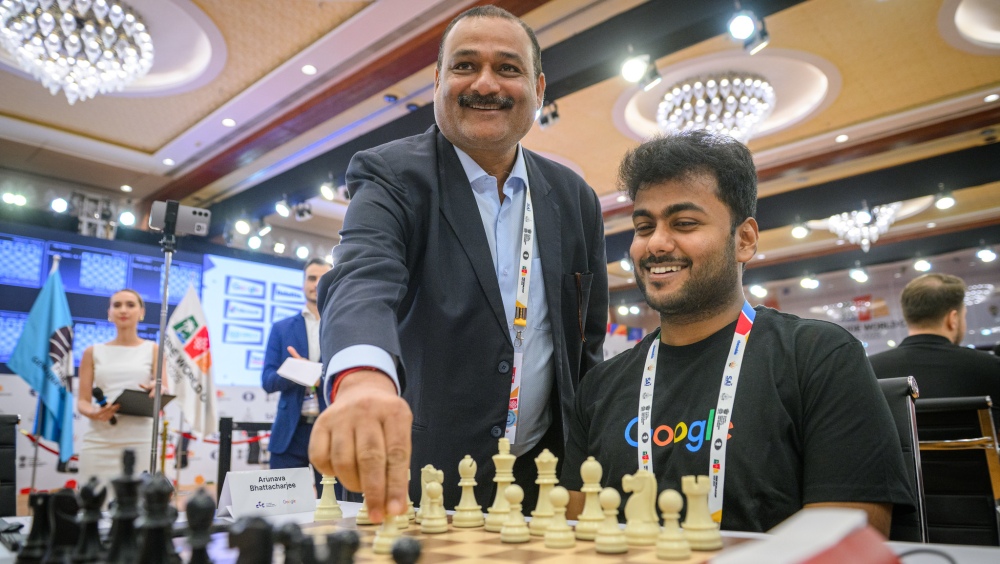
The second edition of the FIDE World Corporate Chess Championship began today in Goa, alongside the FIDE World Cup, bringing together leading international companies to compete for a World Championship title. The event highlights how chess is becoming part of modern workplaces and offers employee teams a global stage to represent their organisations. This year’s finals feature 11 teams, selected from hundreds of companies through online qualifiers and joined by a few invited wild cards. The field spans technology, finance, consulting, engineering, and fast-growing firms from emerging markets. The FWCCC has a clear identity: only true corporate teams take part. Every player is a full-time employee, manager, or board member, and organisations directly connected to chess are not eligible. At the opening ceremony, FIDE Secretary General Lukasz Turlej welcomed participants, saying: “On behalf of the International Chess Federation, I am happy to welcome everyone to Goa. This championship connects the corporate world with the universal language of chess in a special way. We appreciate the All India Chess Federation, the Goa Chess Federation, the Government of Goa, and the Prime Minister of India for enabling us to hold this event here. The corporate chess community is growing quickly, and I am confident we will keep developing these initiatives together in the future. I wish all the teams great games in this unique place, the home of the World Cup and many of the world’s top players this month.” FormatThe 11 teams play a two-day group stage followed by knockout playoffs on Sunday. All matches use a rapid time control of 10 minutes plus a 3-second increment across four boards. The group stage is a round-robin, with match points deciding the standings and game points as the secondary tiebreak. After Saturday’s group stage, the top two teams from each group advance to the semifinals. POOL A — Morgan Stanley sets the pacePool A completed the first half of its double round-robin today. Standings after Day 1: Morgan Stanley — 10 MP / 17 GP Deloitte 1 — 7 MP / 13.5 GP Microsoft — 7 MP / 12 GP UBS — 4 MP / 10 GP Tech Mahindra — 2 MP / 7 GP Equity Bank Kenya — 0 MP / 0.5 GP Morgan Stanley swept all five matches, scoring 4–0 against Tech Mahindra and Equity Bank Kenya and earning decisive wins over Microsoft, Deloitte 1, and UBS. GM Peter Acs, GM Joshua Sheng, IM Peter Lizak, and FM Gabor Szamoskozi collected 17 gamepoints, the highest of the day. Deloitte 1 and Microsoft remain close in the race for second, drawing their head-to-head match. UBS secured an important victory over Tech Mahindra, while the wild-card teams from India and Kenya fought hard throughout the round. POOL B — GRECO perfect, Google and J.P. Morgan close behindWith five teams, Pool B played four rounds today. Standings after Day 1: GRECO — 10 MP / 15 GP Google — 8 MP / 10.5 GP J. P. Morgan — 6 MP / 6.5 GP Deloitte 2 — 4 MP / 6 GP ERG — 2 MP / 2 GP GRECO delivered a flawless day, winning all four matches and conceding only half a gamepoint across the entire pool. GM Volodymyr Onyshchuk led the team on board one, supported by three International Masters who ensured stability on every board. Google secured second place with a 4–0 win over J.P. Morgan in the last round. J.P. Morgan, featuring FM Agustin Ambrogi and FM Ramon Lorente Pupo, finished third after solid results against Deloitte 2 and ERG. Although none of the players are professionals, the level of play was high, with experienced club players and titled competitors representing some of the world’s most recognisable companies. The games were sharp, the atmosphere focused, and the engagement evident. The group stage concludes on Saturday morning with the second half of the double round-robin. With Morgan Stanley and GRECO leading their pools and several challengers still within reach, the race for the title of The Smartest Company in the World remains wide open. Written by Charlize van Zyl, FIDE Press Officer (Goa, India) Photos: Michal Walusza
2025 World Women’s Team Championship: Pools announced

2025 FIDE World Women’s Team Championship pools announced ahead of opening in Linares, Spain With just three days remaining until the official opening ceremony of the 2025 FIDE World Women’s Team Championship, the International Chess Federation (FIDE) has confirmed the composition of the two competitive pools. The championship will be held in Linares, Spain, from November 17 to 24, 2025, in one of the most iconic cities in world chess. Already on site in Linares, Javier Ochoa de Echaguen, President of the Spanish Chess Federation, welcomed the first arriving delegations: “The Spanish Chess Federation is delighted to welcome all delegations attending the Women’s World Team Championship in the historic city of Linares.” Pool A: A clash of heavyweights Team FIDE, led by GM Aleksandra Goryachkina, tops Pool A with an impressive 2496 average rating. Close behind is Team USA, averaging 2406, spearheaded by rising star IM Carissa Yip. Photo: Michal Walusza Team Kazakhstan enters with a 2381 average rating and GM Bibisara Assaubayeva on board one. Following the late withdrawal of Team Algeria due to visa issues, Team Azerbaijan has been nominated as the replacement. With an average rating of 2366, Azerbaijan—led by IM Ulviyya Fataliyeva—significantly elevates the competitive depth of Pool A. Host nation Spain fields a 2339 average rating team, featuring IM Sarasadat Khademalsharieh on top board. Team Peru rounds out the pool with a 2207 average rating, led by IM Deysi Cori T., supported by several of the country’s most promising young talents. Pool B: Hou Yifan returns Pool B is headlined by the return of GM Hou Yifan, four-time Women’s World Champion, who leads Team China to the event with a strong 2473 average rating. Widely recognized as the second-highest-rated female player in history, Hou’s participation adds exceptional prestige to the championship. Photo: Rafal Oleksiewicz Team Georgia (2430), led by GM Nino Batsiashvili, brings a seasoned and balanced roster, while Team Ukraine enters with a 2399 average rating under the leadership of IM Yuliia Osmak. Three evenly matched teams—France, Uzbekistan, and India—each average around 2350. Packed with International Masters and Women Grandmasters, they bring a blend of experience and rising youth. Both Uzbekistan and India are fielding notably young squads, expected to capitalize on the opportunity to gain high-level international exposure. A Championship steeped in tradition Looking ahead to a week of intense competition, Ochoa de Echaguen added:“It is an honour for us to host this prestigious event in a venue that holds such a special place in the history of world chess. We trust that the players, coaches, and accompanying teams will enjoy an excellent stay, dedicated organization, and a competitive atmosphere that reflects the values of respect, excellence, and sportsmanship that define our sport.” Full list of teams with average rating Pool A: FIDE (2496) USA (2406) Kazakhstan (2381) Azerbaijan (2366) Spain (2339) Peru (2207) Pool B: China (2473) Georgia (2430) Ukraine (2399) France (2353) Uzbekistan (2336) India (2334) The full rosters of each team can be consulted [HERE]. For more information about the 2025 FIDE World Women’s Team Championship, media accreditation, or event logistics, please contact FIDE or the Spanish Chess Federation.

